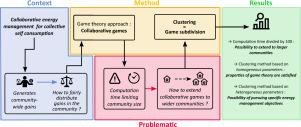Energy management based on coalitionnal game subdivision applied to energy communities
IF 10.5
1区 工程技术
Q1 CONSTRUCTION & BUILDING TECHNOLOGY
引用次数: 0
Abstract
The energy transition requires rethinking how we produce and consume energy. Energy communities (EC) provide a recent legal framework for sharing energy, aiming to reduce energy bills and the environmental footprint of their participants. One of the challenges is adapting economic models to this technological upheaval. In this context, cooperative games, based on game theory, are valuable tools for modeling energy management through cooperation. However, despite their promising characteristics, cooperative games are limited by their computational complexity. The required computation time to solve cooperative games increases exponentially with the number of participants, restricting their application in energy management. This paper aims to propose a solution to apply cooperative game theory tools to larger communities using a multidisciplinary approach. For this purpose, a game subdivision approach based on the specific properties of energy communities is proposed. This methodology will be shown to be efficient in terms of computation time. While the game theory concepts are depreciated by limiting computing time, the sub-games method can become an interesting tool in energy management. Advantages and drawbacks in terms of energy management and game theory are discussed in this paper.

基于联盟博弈细分的能源管理应用于能源社区
能源转型要求我们重新思考如何生产和消费能源。能源社区(EC)为共享能源提供了一个最新的法律框架,旨在减少能源账单和参与者对环境的影响。其中一项挑战是如何调整经济模式,以适应这一技术变革。在这种情况下,基于博弈论的合作博弈是通过合作进行能源管理建模的重要工具。然而,尽管合作博弈具有良好的特点,但其计算复杂性却限制了合作博弈的发展。解决合作博弈所需的计算时间会随着参与人数的增加而呈指数增长,从而限制了其在能源管理中的应用。本文旨在提出一种解决方案,利用多学科方法将合作博弈论工具应用于更大的社区。为此,本文提出了一种基于能源社区特定属性的博弈细分方法。该方法将被证明在计算时间方面是高效的。虽然由于计算时间的限制,博弈论的概念有所贬值,但子博弈方法可以成为能源管理中一个有趣的工具。本文将讨论能源管理和博弈论的优缺点。
本文章由计算机程序翻译,如有差异,请以英文原文为准。
求助全文
约1分钟内获得全文
求助全文
来源期刊

Sustainable Cities and Society
Social Sciences-Geography, Planning and Development
CiteScore
22.00
自引率
13.70%
发文量
810
审稿时长
27 days
期刊介绍:
Sustainable Cities and Society (SCS) is an international journal that focuses on fundamental and applied research to promote environmentally sustainable and socially resilient cities. The journal welcomes cross-cutting, multi-disciplinary research in various areas, including:
1. Smart cities and resilient environments;
2. Alternative/clean energy sources, energy distribution, distributed energy generation, and energy demand reduction/management;
3. Monitoring and improving air quality in built environment and cities (e.g., healthy built environment and air quality management);
4. Energy efficient, low/zero carbon, and green buildings/communities;
5. Climate change mitigation and adaptation in urban environments;
6. Green infrastructure and BMPs;
7. Environmental Footprint accounting and management;
8. Urban agriculture and forestry;
9. ICT, smart grid and intelligent infrastructure;
10. Urban design/planning, regulations, legislation, certification, economics, and policy;
11. Social aspects, impacts and resiliency of cities;
12. Behavior monitoring, analysis and change within urban communities;
13. Health monitoring and improvement;
14. Nexus issues related to sustainable cities and societies;
15. Smart city governance;
16. Decision Support Systems for trade-off and uncertainty analysis for improved management of cities and society;
17. Big data, machine learning, and artificial intelligence applications and case studies;
18. Critical infrastructure protection, including security, privacy, forensics, and reliability issues of cyber-physical systems.
19. Water footprint reduction and urban water distribution, harvesting, treatment, reuse and management;
20. Waste reduction and recycling;
21. Wastewater collection, treatment and recycling;
22. Smart, clean and healthy transportation systems and infrastructure;
 求助内容:
求助内容: 应助结果提醒方式:
应助结果提醒方式:


